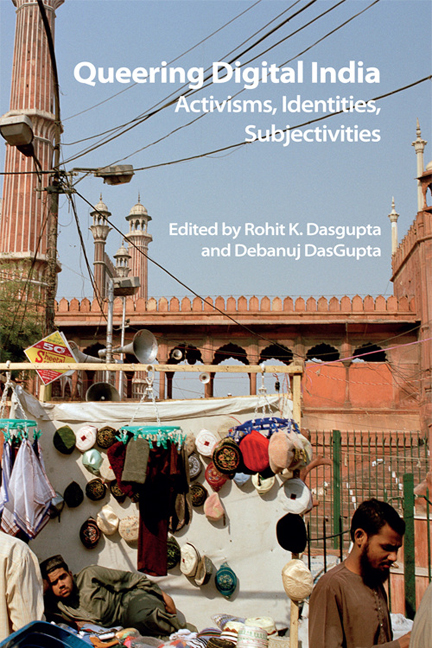3 - Digital Closets: Post-millenial Representations of Queerness in Kapoor & Sons and Aligarh
Published online by Cambridge University Press: 28 April 2021
Summary
Introduction: (G)hosts of the Past
The past two decades have been particularly significant for representations of non-heteronormative subjects in Hindi cinema despite the persistence of Section 377 of the Indian Penal Code, an 1860 law that criminalises sex ‘against the order of nature’ (Kalra and Barupal 2013: 318). Despite the anti-queer law whose history traces back to the heyday of the erstwhile British Empire in India, contemporary images of erotically intimate wives, queer children, incestuous relatives, brutal rapes and hushed sexual liaisons between men have proliferated in Hindi cinema as the more popular, global Bollywood brand continues to produce more films than other film industry in the world (Desai 2004: 373). However, Deepa Mehta's critically-acclaimed film Fire (1998) and Kaizad Gustad's Bombay Boys (1998), both released in the late 1990s, faced sharp criticism for portrayals of Hindu lesbians caught in unfulfilling marriages in joint families and effeminate, gay partygoers in Mumbai. In Mehta's Fire, Hindu matrimony is a patriarchal pivot that compels lesbian desire between protagonists Radha and Sita, while sexually confused Xerxes (Alexander Gifford) of Bombay Boys and his ultra-campy landlord Pesi (Roshan Seth) are ‘classically gay’ characters (often cast for slapstick humour like Sean Hayes’ character Jack in the popular American sitcom Will & Grace) who conform to, rather than challenge, the most mundane stereotypes of emasculated men (Gairola 2001).
Virulent protests over Fire resulted in torched cinema halls in Delhi and Mumbai upon release of the film in 1998, but the Censor Board re-released the film in 1999. This historical contradiction today signals to the ongoing tension created by a colonial-era law in a country that promises to have the world's highest population by 2025. India's booming youth population growth, on the one hand, and technological innovations in the rapid dissemination of global media on the other seem to have empowered the production of filmic narratives that challenge cultural conventions of heteronormativity. These Hindi films include Mira Nair's Kama Sutra: A Tale of Love (1996), Sridhar Rangayan's The Pink Mirror (2003), Vinod Pande's Sins (2005), Quashiq Mukherjee's Gandu (2010), Saad Khan's Hide and Seek (2013), Raj Amit Kumar's Unfreedom (2014), Shonali Bose's Margarita With a Straw (2014) and Pan Nalin's Angry Goddesses (2015).
- Type
- Chapter
- Information
- Queering Digital IndiaActivisms, Identities, Subjectivities, pp. 54 - 71Publisher: Edinburgh University PressPrint publication year: 2018



